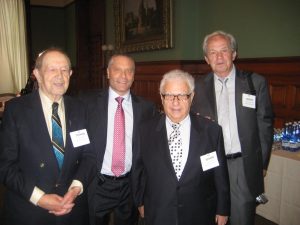A German historian urged Lenka Weksberg to tell her story in Geislingen, where she was imprisoned in a concentration camp
There are countless survivor stories, all of which illustrate the hopelessness, the inhumanity, and horror of the Holocaust, as well as the strength and will to survive.
Despite the similarities, it seems one can never hear the same story twice.
And when 90-year-old Holocaust survivor Lenka Weksberg, who has spent several years sharing her testimony at high schools, churches, and in front of non-Jewish groups, was asked by family and friends to share her unique story with them, she obliged.
“In those days, I faced death every day of my life,” Weksberg told 50 of her close friends and family at her son’s home in Thornhill on June 27.
After she was deported with her family of eight from her home in Czechoslovakia to a ghetto in Hungary in 1944, they spent four weeks in a cramped attic with several other families before they were herded onto a cargo train and transported to Auschwitz-Birkenau.
“Day and night, cargo trains were bringing children, old people, people of all ages, packed like animals going to the slaughter houses, direct to the crematoriums,” she said.
She said when they arrived at Auschwitz, they were face to face with Joseph Mengele, known as the Angel of Death.
“He decided if you lived or died. If he pointed to the right, you lived. If he pointed to the left, you had to go to the showers to be killed by Zyklon-B gas,” Weksberg said.
“My mother was sent to the left to die. My sister, Rosalie, age 12, was also sent to the crematorium. We ran after Dr. Mengele, pleading with him to let my little sister go with us… the number of the people sent to the gas chamber had to equal 100… There was a mother who… insisted on dying with her daughter. She took Rosalie’s place in the shower line.”
Although her sister avoided the gas chamber that day, countless friends and relatives, including her mother and brother were not so lucky.
Weksberg and her four sisters spent three months in Birkenau before they were grouped with 800 female prisoners to work as labourers at a German military factory in Geislingen.
She said although Geislingen “was not a direct route to extermination,” they were hungry, cold, and exhausted by the forced labour.
They were transported to Allach, a sub-camp of Dachau.
“When we arrived at the concentration camp, we saw piles and piles of human bodies… they were lifted up by a bulldozer, as if they were garbage and put onto trucks to be taken away,” she recalled.
The following day, they were forced on a death march to a train in the middle of a German forest.
“After loading into the train, we travelled for days without food or water. The train went back and forth, without a destination. On the third day, April 30, 1945, we heard artillery fire. I thought they were shooting the prisoners… When the door opened, we were liberated by the American army,” Weksberg said.
“I did not celebrate my freedom at that time… What shall I do with my freedom? Where shall I go?”
Following the war, Weksberg snuck back into Czechoslovakia. Although she was caught by Romanian police, she was let go when they learned that she was a Holocaust survivor. She lived in Prague for a year, before she went to Israel, and ultimately settling in Toronto in 1953.
Weksberg has since returned to Geislingen, after a German Holocaust historian tracked down Weksberg and her sisters, all of whom are living throughout North America, to come to the town to tell their stories to locals and high school students.
When Weksberg travelled there in November, she lectured to the students about her story, many of whom were unaware that their town was the site of a concentration camp.
She urged her friends and family, just as she urged the people of Geislingen, to fight intolerance, bigotry and hatred.
“It’s not only a Jewish problem now. It is the world’s problem, too… We must remember the terrible price paid for bigotry and hatred,” she said.
“Now, this is your story. For tomorrow, it is more important than yesterday. My most important message is although we can’t change the past, we can influence the future to live in harmony and peace.”






